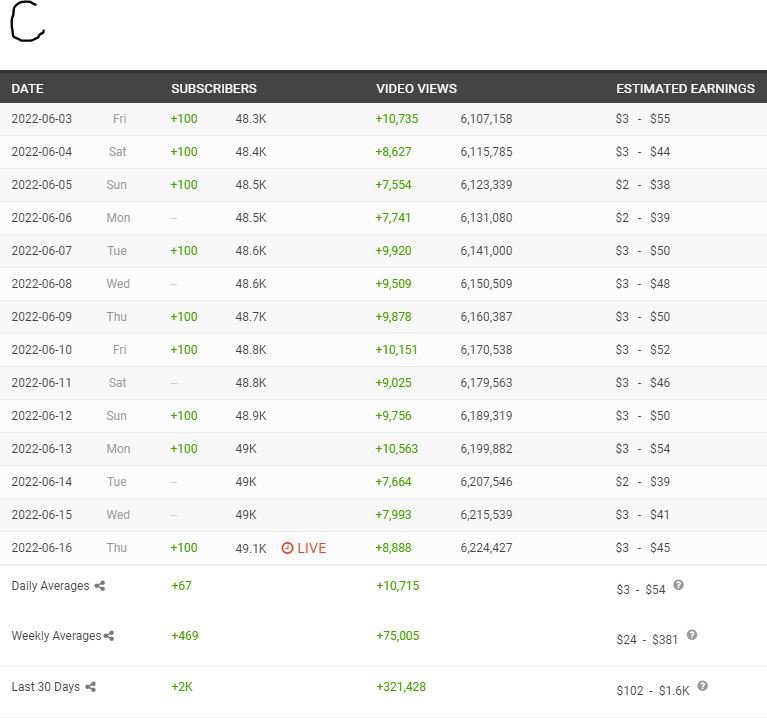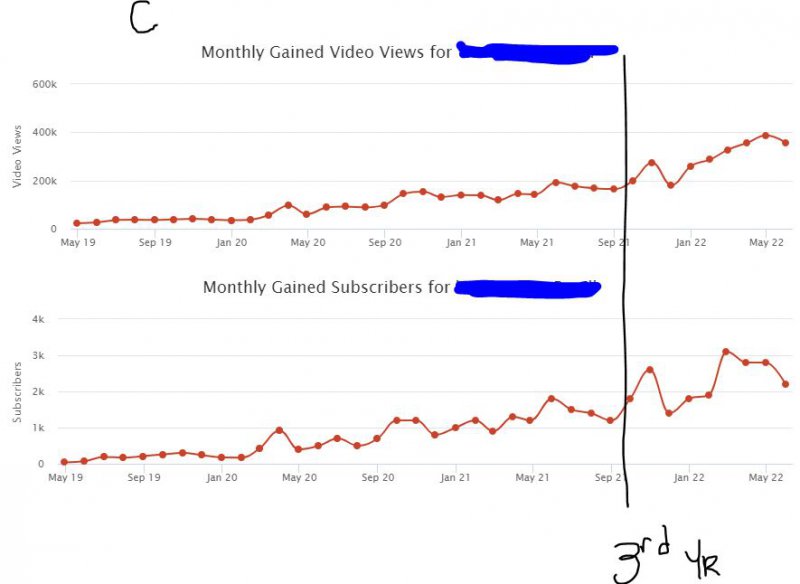- 2,644
- 25
- Subscriber Goal
- 250000
Recently I have been trying to improve the style of my videos... I spent some time studying shows on TV in order to adapt a more professional appearance in my videos. But something was still missing. While the quality of my filmography has improved there is still an emptiness to my videos that I have been seeing. Damon and I often talk about telling a story in our videos. This is a mantra that I hold strong to... but sometimes let slip by the wayside.
Like many of the people here I do not script my videos. I go out to the beach with a fishing pole and I let the events of the day tell the story. But this is a very shallow type of story-telling and I want to improve this. Here is what I have learned about how to turn your video on it's heels and to tell a solid, intriguing story.
Strong Ideas
Recently on the TubeBuddy YouTube channel we posted a video about the things you can do to make your video 10x better:
View: https://www.youtube.com/watch?v=zsO1Oayp7kg
Mr. Beast mentions in our video that "the difference between a video with a million views and thirty million views; the video with 30 million views usually did not put in 30 times the effort. They might have put in two or three times the effort and just had a way better idea." This is something that we are all struggling with. Maybe you have a decent idea... but decent ideas don't make viral videos. They are placeholders in your content schedule, they fill the void between other videos and they add to your library. And that is about it. Focus on taking more time to turn your decent ideas into concepts that hold more potential for amazement.
Is it A Topic Or A Story?
This is a problem that I struggle with, and one that I am personally going to start focusing on. My videos are the representation of a day spent fishing at a certain location, for a certain species. It's a simple vlog with some above-average cinematography, editing and a little dash of personality to spice things up. My videos are topic oriented. That is great for the How-To crowd... but it is rare that a How-To video goes viral and propels the creator into the stratosphere of YouTube's elite. That is where the Story comes into play. The difference between a Topic and a Story? A Story has conflict. There needs to be a goal and the video is the journey to that goal.
Who Is The Main Character?
Sure... you. Right? You are the main character in your story (Let's be honest... if you are on making videos on YouTube there is about a 95% chance you are a serial narcissist just like the rest of us). Sooo, as the main character of your story who are you? There is a common element that movies, TV, books et cetera use when fleshing out a main character. They have 5 traits that define who they are. These traits provide solidarity for that character; they can not be broken or changed and they tell the viewer who this person is so that they can decide whether this character is someone they align with. The viewer should know who this character is in the first 5%-10% of the video. After figuring out this character's traits you are going to need to give them a desire for something in this video. The video has a beginning, and in order for there to be a journey to the end this character needs to want something and whether they get it at the end determines if this story is a comedy (they get it) or a tragedy (they don't).
Since I do fishing the consensus is that I must catch fish in order to have a viable story and therefore a video to present. Far too often creators ignore the value in presenting a 'failed video' as a tragedy. Often they give up on the video without delving into the failure as a possible story in it's own regard.
Script Your Story
So this is going to be obvious... and yet still so misunderstood and ignored. And I get it; I don't script my videos either... except that I do and yes, you do too. We just do it poorly. You see, we have this idea in our head of what the video is going to be. We are going to run around shooting people in Fortnite, we are going to bake these cookies or we are going to the beach to film our fishing trip. That is the script. While I can not script the fish that I am going to catch they are not the story. They may be a topic. The cookies you bake and your KDR are a topic. But these are not the story. The story is the journey of how we get to the end of that topic. I can script a story of waking up early in the morning, dragging my wife and daughter out of bed at 3 a.m. so that we can drive 60 miles down a desolate stretch of beach to fish a shipwreck from 1909. You can script the story of the recipe your grandmother handed down to you or the hundreds of hours you spent learning and mastering the art of building in Fortnite, only to have this ability taken away. There are stories that can be told throughout the course of your video that give it a deeper, more meaningful journey. It's magic if that happens on it's own, but this is something that can be scripted in advance and adds layers to a concept that could have easily been another simple topic for another simple video.
Like many of the people here I do not script my videos. I go out to the beach with a fishing pole and I let the events of the day tell the story. But this is a very shallow type of story-telling and I want to improve this. Here is what I have learned about how to turn your video on it's heels and to tell a solid, intriguing story.
Strong Ideas
Recently on the TubeBuddy YouTube channel we posted a video about the things you can do to make your video 10x better:
Mr. Beast mentions in our video that "the difference between a video with a million views and thirty million views; the video with 30 million views usually did not put in 30 times the effort. They might have put in two or three times the effort and just had a way better idea." This is something that we are all struggling with. Maybe you have a decent idea... but decent ideas don't make viral videos. They are placeholders in your content schedule, they fill the void between other videos and they add to your library. And that is about it. Focus on taking more time to turn your decent ideas into concepts that hold more potential for amazement.
Is it A Topic Or A Story?
This is a problem that I struggle with, and one that I am personally going to start focusing on. My videos are the representation of a day spent fishing at a certain location, for a certain species. It's a simple vlog with some above-average cinematography, editing and a little dash of personality to spice things up. My videos are topic oriented. That is great for the How-To crowd... but it is rare that a How-To video goes viral and propels the creator into the stratosphere of YouTube's elite. That is where the Story comes into play. The difference between a Topic and a Story? A Story has conflict. There needs to be a goal and the video is the journey to that goal.
Who Is The Main Character?
Sure... you. Right? You are the main character in your story (Let's be honest... if you are on making videos on YouTube there is about a 95% chance you are a serial narcissist just like the rest of us). Sooo, as the main character of your story who are you? There is a common element that movies, TV, books et cetera use when fleshing out a main character. They have 5 traits that define who they are. These traits provide solidarity for that character; they can not be broken or changed and they tell the viewer who this person is so that they can decide whether this character is someone they align with. The viewer should know who this character is in the first 5%-10% of the video. After figuring out this character's traits you are going to need to give them a desire for something in this video. The video has a beginning, and in order for there to be a journey to the end this character needs to want something and whether they get it at the end determines if this story is a comedy (they get it) or a tragedy (they don't).
Since I do fishing the consensus is that I must catch fish in order to have a viable story and therefore a video to present. Far too often creators ignore the value in presenting a 'failed video' as a tragedy. Often they give up on the video without delving into the failure as a possible story in it's own regard.
Script Your Story
So this is going to be obvious... and yet still so misunderstood and ignored. And I get it; I don't script my videos either... except that I do and yes, you do too. We just do it poorly. You see, we have this idea in our head of what the video is going to be. We are going to run around shooting people in Fortnite, we are going to bake these cookies or we are going to the beach to film our fishing trip. That is the script. While I can not script the fish that I am going to catch they are not the story. They may be a topic. The cookies you bake and your KDR are a topic. But these are not the story. The story is the journey of how we get to the end of that topic. I can script a story of waking up early in the morning, dragging my wife and daughter out of bed at 3 a.m. so that we can drive 60 miles down a desolate stretch of beach to fish a shipwreck from 1909. You can script the story of the recipe your grandmother handed down to you or the hundreds of hours you spent learning and mastering the art of building in Fortnite, only to have this ability taken away. There are stories that can be told throughout the course of your video that give it a deeper, more meaningful journey. It's magic if that happens on it's own, but this is something that can be scripted in advance and adds layers to a concept that could have easily been another simple topic for another simple video.


